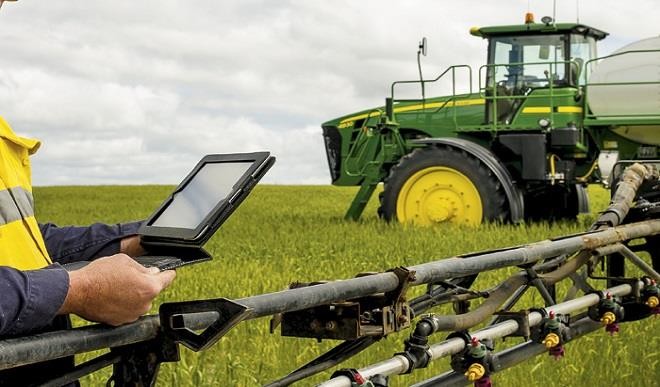Tweeting from the field: how farmers are using social media
Piglets are nibbling on his shoelaces, but Marcus Holtkoetter only has eyes for his tablet: he’s engaged in a fierce Twitter debate about the herbicide glyphosate. More than 1,400 people follow him on the social media service, and he recently sent his 10,000th tweet. Farmers from all over the world have joined Twitter and other […]


Piglets are nibbling on his shoelaces, but Marcus Holtkoetter only has eyes for his tablet: he’s engaged in a fierce Twitter debate about the herbicide glyphosate.
More than 1,400 people follow him on the social media service, and he recently sent his 10,000th tweet.
Farmers from all over the world have joined Twitter and other social media in a bid to exchange views and give others an insight into their work.
In Australia, dairy farmer Charles Wallis tweets about his daily life, as well as calling politicians and their agricultural policies to account.
In the US state of Maine, Lisa Steele uses Facebook to chat about chicken rearing and gardening. And in Britain, Essex farmer Will Wilson swaps tips about sheep shearing and silage sheets.
Blogs are also popular. One of Germany’s most-read is written by "Bauer Willi" (Farmer Willi) from the Rhineland, who pontificates on everything from the country’s milk crisis to the rights and wrongs of industrial livestock farming.
"We need an honest dialogue," says pig farmer Holtkoetter. Dialogue between farmers, consumers and politicians has disappeared, he says, which often creates misunderstandings and mistrust.
"The fact that I regulate the feeding of the pigs with my iPhone doesn’t fit with a lot of people’s romanticized ideas of farming, but once I’ve explained it to them they understand the advantages," he continues.
Not every blogger has as a big an audience as Holtkoetter. But Kirsten Karotki of the German Association of Farmers says lots of people follow the activities of local farmers on Facebook.
"Their reach is a lot greater than just the agricultural scene," she says. Animal rights activists and other critics often get involved in discussions with them, she adds.
But whereas Facebook is most often used to help keep the local public up to date, farmers on Twitter tend to delve more into the specifics of their industry. Politics also comes up.
At 22, Thomas Fabry is probably one of the youngest farmers on social media. "Why isn’t there a perfume that smells of freshly mown grass?" he asks in his Instagram profile.
On Snapchat, photos show him chopping wood and repairing his tractor – though he’s keen to counteract stereotypes. "There are 1,000 different ways of practicing agriculture – and not just being a farmer," he says.
Because Instagram and Snapchat are popular with his generation, he hopes he can use his posts about his job to enthuse them. "I’m a huge fan of Snapchat," he says. "The community is very close, and the dialogue is very open and honest."
That’s in contrast to Facebook, he adds, where bloggers often have to deal with trolling. In an effort to deal with these sorts of challenges, a group of German farmers met for the first time in person in December.
Around 100 farmers came together in the western city of Muenster for the first "Agricultural Blogging Camp."
Workshops on digital storytelling and crisis communication were as much on the agenda as the wish to get to know each other in real life and exchange views.
While successful bloggers in the fashion and travel industries can often live off their blogs because businesses use them to advertise, the same is not true for farmers, even though they may invest significant amounts of time in their online activities.
"Sometimes it’s a full-time job," says Holtkoetter.
Nevertheless, he’s determined to keep up his social media work alongside his farming.
"Why are the calves all alone in their pens? How do the fields get their furrows? [People ask] questions to which the answers seem obvious to me," he says of his discussions with followers.
"I just have a lot of fun doing it." (DPA)
